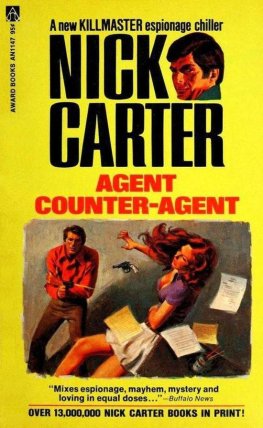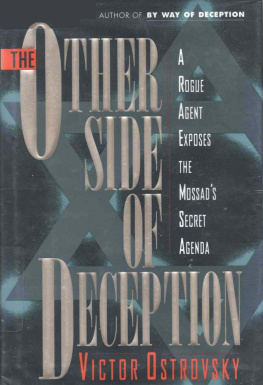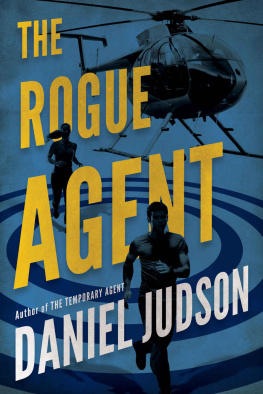Cliff Ryder - The Powers That Be
Here you can read online Cliff Ryder - The Powers That Be full text of the book (entire story) in english for free. Download pdf and epub, get meaning, cover and reviews about this ebook. genre: Detective and thriller. Description of the work, (preface) as well as reviews are available. Best literature library LitArk.com created for fans of good reading and offers a wide selection of genres:
Romance novel
Science fiction
Adventure
Detective
Science
History
Home and family
Prose
Art
Politics
Computer
Non-fiction
Religion
Business
Children
Humor
Choose a favorite category and find really read worthwhile books. Enjoy immersion in the world of imagination, feel the emotions of the characters or learn something new for yourself, make an fascinating discovery.

- Book:The Powers That Be
- Author:
- Genre:
- Rating:4 / 5
- Favourites:Add to favourites
- Your mark:
- 80
- 1
- 2
- 3
- 4
- 5
The Powers That Be: summary, description and annotation
We offer to read an annotation, description, summary or preface (depends on what the author of the book "The Powers That Be" wrote himself). If you haven't found the necessary information about the book — write in the comments, we will try to find it.
The Powers That Be — read online for free the complete book (whole text) full work
Below is the text of the book, divided by pages. System saving the place of the last page read, allows you to conveniently read the book "The Powers That Be" online for free, without having to search again every time where you left off. Put a bookmark, and you can go to the page where you finished reading at any time.
Font size:
Interval:
Bookmark:
Cliff Ryder
The Powers That Be
The first book in the Room 59 series
Francisco Garcia Romeros world had been reduced to two sensations: light and pain.
The light came from the bare, wire-caged, hundred-watt bulb in his windowless, four-by-eight-foot punishment cell.
Always burning, it turned the already sweltering space into a cramped oven, and had long ago stripped Francisco of any notion of the time of day. It limited his sleep to fitful minutes here and there, throwing his arm over his eyes until it cramped and he moved, which exposed his face to the harsh glare again. Its brilliance burned into his retinas. The light exposed every mark on his naked body, every bruise, every cut, every mosquito bite, every sore in stark relief, revealing the pitiful shell of the man and father he used to be.
Emaciated and filthy, he huddled on the dirty concrete floor of his cell in Quivicn maximum-security prison, with no mattress, blanket or even a concrete bed to sleep on. It had been a good day so far, because the hole in the floor where he relieved himselfwhen he could muster both the energy to do so and the fortitude to handle the pain it causedhadnt overflowed yet. Also, he had managed to keep down the cup of watery, unidentifiable soup and handful of rice that had been doled out a few hours earlier.
But the rattle of his cell door as it was unlocked meant that time was at an end.
Nmero treinta y cinco, salga! One of the fatigue-clad guards barked the order. Since his detention had begun here, the guards had only referred to him by a numberthirty-five.
Francisco crawled to the door and out into the hallway, where the two men grabbed him by the shoulders and yanked him to his feet, ignoring his whimper of pain as his shoulder was wrenched back. They placed him against the wall and searched hima seemingly useless gesture, since he was already naked, that was meant to humiliate and further degrade him. Francisco waited with his legs apart, wondering which pair would accompany him this time. There was only a casual inspection of his buttocks today, so it must have been Guards Three and Four, as he called them. The other pair of guards, One and Two, took an unpleasant interest in certain parts of his anatomy, and used every opportunity to torment him with the ends of their batons or other items.
Satisfied he wasnt carrying any contraband, the two guards pushed him down the hall toward the interrogation area. As he did every time this happened, Francisco whispered his usual litany:
Padre nuestro, que ests en los cielos, Santificado sea tu Nombre.
Venga tu reino,
Hgase tu voluntad,
En la tierra como en el cielo.
He always tried to finish the Lords Prayer before being silenced by one of the guards or entering the interrogation room. If he could do that, he believed it gave him the inner strength to resist whatever they had planned for him. And just like every other time he had been taken to these small rooms, a part of him wondered if this time he would break under the endless torture, and tell them everything he knew.
As he shuffled down the hallway, he tried to ignore the flashes of pain from his battered body. Everything hurt, from the deep throbbing of his improperly-healed shoulder, injured in his very first interrogation and beating, to the burning pain in his rectum from the near constant diarrhea combined with torn sphincter muscles and the resulting infection from when he had been sodomized a few weeks earlier. The assault hadnt come from the guards, but from an enforcer for the prisoners counciltrustees given limited authority by the wardenwhen they learned he was planning a hunger strike to protest the inhumane conditions.
Those, along with numerous other injuries, were a constant reminder of every minute he spent here, and also what had been stripped from him since his very first night in captivitynot just his limited freedom on the outside, but his dignity, health and free will.
Ever since he had been rousted from his bed in the dead of night so long ago and herded through a bewildering series of prisons, interrogations, torture and starvation, Francisco had clung to the slim hope that he might be released, or at least be allowed to stand trial for his supposed crimes. But as the days had stretched into weeks, and then months, and he had endured the near daily beatings, the deprivation of basic human needs and other mental and physical tortures, Francisco realized that he wasnt going to be saved. Unlike others, such as the poet Armando Valladares, who had gained international recognition for the abuse he had endured, Francisco was just one of hundreds of low-level political prisoners trapped in the grinding wheels of the governments relentless repression of basic human rightswhat he had been fighting for every day.
Now, with his incarceration stretching into its sixth or seventh monthhe wasnt sure exactly how long it had beenFrancisco had lost hope of ever seeing the outside world again. He hadnt seen his wife and son in at least three months, and wasnt even sure they knew where he was anymore, since he had been moved several times before ending up at Quivicn. All he could do now hold one rational thought in his mind. No matter what happened, he would never betray his fellows still struggling to free Cuba from the Communist dictatorship. It was the one goal he still clung toeven though he couldnt be sure, given his semi-lucid state from hour to hour, that he hadnt already done so.
The interrogators had certainly tried hard to break him. They had taken him from his stifling cell to an air-conditioned room and left him there for hours before questioning him, when he could barely answer through chattering teeth. The beatings and malnutrition were bad, but it was during the third month that they had come closest to breaking him.
Just when he was coming to terms with the cruel conditions, the guards had come to his cell and told him he was being released. They had allowed him to wash up and shave, given him a decent meal, then escorted him to the main doors of the prison. And there, with freedom just a few yards away, the commander of the prison had walked up and told him that it was a mistake, that he was going back to his cell. It had taken three guards to wrestle him back into his cell that day. He had been beaten for resisting them, and that night he had been beaten again by fellow prisoners, who suspected he had made some kind of deal with the government to betray them.
Since that day, Francisco had resisted his captors as much as possible, but he had steadily weakened. He was on the edge of telling them whatever he could to get out of his punishment cell, receive some medical treatment, even just get a bare concrete bed to sleep on. His only solace was that if they ever broke him, he wouldnt be able to tell them much.
His mostly bare-shelved bodega had been a drop point for messages among cells of the resistance, but he had never known who any of the contacts really were besides the man who had recruited him long ago. Francisco wasnt a government informer, but obviously someone in one of those cells he had serviced was.
Guard Three opened the interrogation-room door and entered, followed by Francisco, who stumbled in, assisted by a shove from Guard Four. The room looked like every other room he had been questioned in. A rattling air conditioner blew cold air across his fevered skin, and there were the standard two chairs and a small table in the center of the room. What was different, however, was the man sitting in the chair on the other side of the table.
He was a high-ranking member of the Cuban Revolutionary Armed Forces, at least a major, according to his epaulets.
He was taller than the usual Cuban soldier. Even seated he loomed over the table. His features were unusual, too. He didnt have the usual dark caramel coloring of the majority of the people. His skin tone was a few shades lighter, almost caf au lait. Francisco thought he was mulatto, perhaps part African, but that his nose wasnt broad, but narrow and long, almost patrician. And his eyeswhich had locked onto the prisoner with the usual single-minded zealwere a common light blue, not the expected dark brown.
Font size:
Interval:
Bookmark:
Similar books «The Powers That Be»
Look at similar books to The Powers That Be. We have selected literature similar in name and meaning in the hope of providing readers with more options to find new, interesting, not yet read works.
Discussion, reviews of the book The Powers That Be and just readers' own opinions. Leave your comments, write what you think about the work, its meaning or the main characters. Specify what exactly you liked and what you didn't like, and why you think so.





